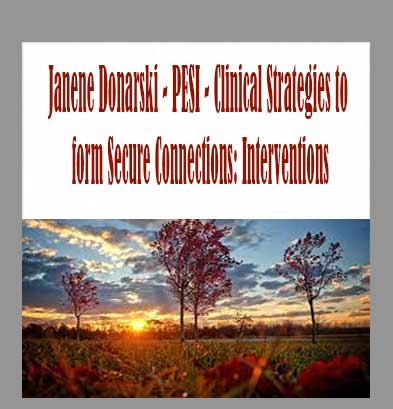Description
Janene Donarski – PESI – Clinical Strategies to form Secure Connections: Interventions for Oppositional Defiant, Reactive Attachment, Conduct, & Other Disruptive Disorders download, Janene Donarski – PESI – Clinical Strategies to form Secure Connections: Interventions for Oppositional Defiant, Reactive Attachment, Conduct, & Other Disruptive Disorders review, Janene Donarski – PESI – Clinical Strategies to form Secure Connections: Interventions for Oppositional Defiant, Reactive Attachment, Conduct, & Other Disruptive Disorders free
Janene Donarski – PESI – Clinical Strategies to form Secure Connections: Interventions for Oppositional Defiant, Reactive Attachment, Conduct, & Other Disruptive Disorders
Positive Strategies for Attachment Issues that Build Trust and Connection:
Many children temporarily or permanently lose connection with their parents through foster care or adoption, death, separation, divorce, parental imprisonment, or even military tours of duty.
In the short run, emotional dysregulation can lead to behavior problems and school issues, and in the long run disrupted attachment can leave children and teens at risk for substance abuse, criminality, homelessness, poor physical and psychological health, and even early mortality. Parental loss and the trauma associated with it can make it difficult for youth to form bonds in a new relationship.
Dr. Janene Donarski, PhD, LP, LMSW, will help you learn how to identify and work with attachment, reaction, meaning, bonding, and support, (ARMBandS), a strategy she developed to address the emotional difficulties of many foster and adopted children, as well as other youth who have endured parental separation and who are unable to form secure attachments. Dr. Donarski will lead you in an in-depth exploration of ways to help children and youth experience and accept affective attunement, in an effort to encourage a secure attachment that can lead to emotional connectedness and behavioral change.
This recording is a must for all mental health professionals who want to learn clinically tried-and-true approaches for facilitating emotional reparation and recovery from trauma, as well as strategies for working with children and youth who have been diagnosed with Oppositional Defiant Disorder, Conduct Disorder, Reactive Attachment Disorder, Disinhibited Social Engagement Disorder, Post-Traumatic Stress Disorder, and/or Adjustment Disorder. Dr. Donarski will explore the topics of parental loss, trauma, building trust, self-regulation, resilience, and post-traumatic growth in an interactive hands-on workshop that will prepare you to promote secure attachments between caregivers and the children and teens that you serve.
Speaker
Janene Donarski, PhD, LP, LMSW, CCATP
Janene M. Donarski, PhD, LP, LMSW, CCATP, is a fully licensed clinical psychologist and licensed master social worker who works in counseling therapy as well as psychological testing for mental health issues. Dr. Donarski specializes in neuropsychological assessment of children, adolescents, adults and geriatric populations including head injury, organic issues, emotional and complex behavior disorders. Dr. Donarski works extensively with anxiety issues including panic, hypervigilance and PTSD. She trains others in techniques of relaxation, reduction of fear, and exposure therapies to reduce triggers and symptoms in daily life. She also assists in testing within the academic areas including ADHD, learning disabilities and autism for IEPs and/or 504 plans/behavior plans.
Dr. Donarski works with all population counseling/therapy, including individual, martial/couple, family, LGBTQ, and group counseling. She is a certified EMDR Level II counselor as well as a certified hypnotherapist and practitioner for Neuro-Linguistic Programming and Time Line Therapy®.
Dr. Donarski is also experienced in working with victims of violence, foster care/adoption issues, sexual issues, as well as those who are seeking sex offender treatment. She often works with attorneys as a forensic psychologist/expert witness for legal cases involving custody, guardianship, social security benefits, and criminal cases. Dr. Donarski has spoken on a variety of mental health issues, including somatic ailments, behavioral disorders and mental health concerns in the geriatric population.
Speaker Disclosures:
Financial: Dr. Janene Donarski maintains a private practice. She receives a speaking honorarium and recording royalties from PESI, Inc. She has no relevant financial relationships with ineligible organizations.
Non-financial: Dr. Janene Donarski is a member of the American Psychological Association, the Michigan Psychological Association, the National Association of Social Workers, the American Counseling Association, and others.
Objectives
- Examine the relationship between trauma and parental loss, trust, self-regulation, attachment, bonding, resilience, and post-traumatic growth in young clients
- Explore clincial interventions that help child and adolescent clients experience and accept affective attunement that leads to attachment with caregivers
- Identify client reactions or behaviors that indicate the success of clinical attachment strategies
- Discuss developmentally-appropriate clinical intervention strategies for helping children and youth to build trust with caregivers including foster parents, parents, and grandparents, and develop a positive view of self
- Use clincial intervention approaches that facilitate child and adolescent emotional reparation and resilience, while building self-regulation skills that are applicable with children, families, and groups
Outline
ARMB and S: STRATEGY TO HELP YOUTH WHO HAVE EXPERIENCED TRAUMA AND LOSS
- Attachment
- Reaction
- Meaning
- Bonding
- Support
HOW ARMB and S CAN HELP CHILDREN AND YOUTH DEVELOP:
- Trust
- Self-regulation
- Bonding (interpersonal connectedness)
- Resilience
- Post-traumatic growth
ATTACHMENT: HEALTHY vs UNHEALTHY
- What is attachment?
- How do attachment and emotional development intersect?
- Secure attachment
- Disrupted attachment
- Loss and trauma
- Abandonment
- Techniques that empower caregivers to set the stage for attunement and attachment
- Interactive attachment skill builder
REACTION: WHAT DO THEIR BEHAVIORS TELL US?
- The Skinner box
- Consistency
- Re-visit the developmental milestones
- Accessibility
- Responsiveness
- Emotional connectedness and bonding
- Evidence of care technique success
- Interactive skill builder
MEANING: CREATING/RECREATING POSITIVE SELF
- Assessment – effective, comprehensive, reliable
- What’s the meaning of life (and why does it matter)?
- Elementary age youth
- Middle school age youth
- High school age youth
- How to demonstrate that they have meaning to you
- Interactive skill builder: empowering caregivers to demonstrate meaning
BONDING: DEVELOPMENT OF INTERPERSONAL CONNECTEDNESS
- Setting the stage to build trust
- Need fulfillment
- Developmentally appropriate strategies for bonding
- 0-3
- 3 years and older
- Adolescents
SUPPORT: DEVELOPING RESILIANCE AND GROWTH
- Parental loss and grief
- Trauma
- Preventing PTSD in children
- Self-regulation skills and emotional reparation
- Resilience
- Developmentally targeted post-traumatic growth
- Strategy for youth with:
- Oppositional Defiant Disorder
- Post-Traumatic Stress Disorder
- Reactive Attachment Disorder
- Disinhibited Social Engagement Disorder
- Conduct Disorder
- Adjustment Disorder
- How to support ongoing attachment and post-traumatic growth
Target Audience
- Social Workers
- Counselors
- Psychologists
- Marriage and Family Therapists
- Case Managers
- Child Advocacy/Protective Service Staff
- Psychiatric Nurses
- Nurse Practitioners
- Psychiatrists
- Educators
Frequently Asked Questions:
- Innovative Business Model:
- Embrace the reality of a genuine business! Our approach involves forming a group buy, where we collectively share the costs among members. Using these funds, we purchase sought-after courses from sale pages and make them accessible to individuals facing financial constraints. Despite potential reservations from the authors, our customers appreciate the affordability and accessibility we provide.
- The Legal Landscape: Yes and No:
- The legality of our operations falls into a gray area. While we lack explicit approval from the course authors for resale, there’s a technicality at play. When procuring the course, the author didn’t specify any restrictions on resale. This legal nuance presents both an opportunity for us and a boon for those seeking budget-friendly access.
- Quality Assurance: Unveiling the Real Deal:
- Delving into the heart of the matter – quality. Acquiring the course directly from the sale page ensures that all documents and materials are identical to those obtained through conventional means. However, our differentiator lies in going beyond personal study; we take an extra step by reselling. It’s important to note that we are not the official course providers, meaning certain premium services aren’t included in our package:
- No coaching calls or scheduled sessions with the author.
- No access to the author’s private Facebook group or web portal.
- No entry to the author’s exclusive membership forum.
- No direct email support from the author or their team.
We operate independently, aiming to bridge the affordability gap without the additional services offered by official course channels. Your understanding of our unique approach is greatly appreciated.
- Delving into the heart of the matter – quality. Acquiring the course directly from the sale page ensures that all documents and materials are identical to those obtained through conventional means. However, our differentiator lies in going beyond personal study; we take an extra step by reselling. It’s important to note that we are not the official course providers, meaning certain premium services aren’t included in our package:
Refund is acceptable:
- Firstly, item is not as explained
- Secondly, Item do not work the way it should.
- Thirdly, and most importantly, support extension can not be used.
Thank you for choosing us! We’re so happy that you feel comfortable enough with us to forward your business here.








Reviews
There are no reviews yet.